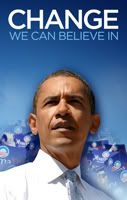In an interview with The Associated Press, Edwards said he was trying to ease fears about his electability by arguing that his sharply populist message is not polarizing. "It's not divisive at all," he said, "it's uniting."
The public is rightfully upset with Congress over their failure to stop Bush's agenda in 2007. But the answer is to play hardball while strategizing for a larger majority in the next election, not to find more ways to compromise. Previous calls from the GOP for moderation merely provided the political cover to stay the course, and the result has been a legislative agenda vastly out of sync with the views of its electorate on every key policy issue: the war, fiscal responsibility, healthcare, energy.As regular readers know, I've been pondering this infuriating fixation on bipartisanship and moderation for the last couple of weeks and watching aghast as the press does the wingnuts' bidding, setting up the Dems as failing to fulfill their promise to the American people that they would be moderate and bipartisan if they won the election. This was simply not on the agenda during the election, other than that the House Democrats would restore some sort of fairness to the rules and pass anti-corruption legislation. In fact, the entire election was about the Democrats taking power to provide some needed checks and balance on the Republicans.
Oddly, however, in the last couple of weeks, the media has been obsessing that the election reflected a desire among the American people for the congress to stop fighting and work together, which makes no sense. The Republican congress didn't fight --- the Democrats just caterwauled ineffectually from the sidelines, while the Republicans did what they wanted. There was no gridlock, they passed virtually every piece of legislation they wanted and the congress was perfectly in sync with the president. If comity was what people were concerned about they obviously would have kept undivided government.
The American people voted for the Democrats because they wanted them to stop the Republican juggernaut.







No comments:
Post a Comment